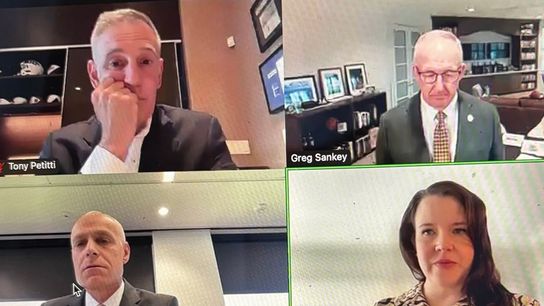Heads of the ACC, Big Ten, Big 12, Pac-12 and SEC convened by video Monday morning to discuss the direction college sports continue to move in the wake of Friday's formal passage of the House Settlement.
And while SEC head Greg Sankey confirmed his Sunday afternoon round of golf with President Donald Trump and Notre Dame's Pete Bevacqua, the session mostly was very general discussion with little substance as to how, exactly, everyone moves forward since U.S. District Court Judge Claudia Wilken on Friday formally approved the $2.8 billion House Settlement that was the final legal hurdle (for now) to have institutions directly paying their current student-athletes, as well as also providing backpay for previous athletes.
Said Sankey, "I've always appreciated (Triump's) interest in college sports. It was helpful for me and for Pete as well to hear his thought and perspective and share some of ours."
Those thoughts?
"I think those are best left for the moment on the golf course."
Revenue-sharing payments for the House Settlement are scheduled to begin July 1; three weeks from Tuesday. For much of the past 12-24 months, college leaders and athletics departments have been trimming costs and operating budgets, as well as also seeking new revenue streams.
Notre Dame, for example, has announced its intention to begin selling alcoholic beverages on campus at all Irish football, men's and women's basketball and hockey games. The Irish also have had budget cuts and a much-publicized hiring freeze earlier this year.
Tennessee has already enacted a "talent fee" atop its ticket prices, a measure UT Athletics Director Danny White said was strictly to generate funding to compensate student-athletes.
Jim Phillips, ACC commissioner, addressed the potential for punishment of Name, Image and Likeness deals that do not get approved by third-party overseer Deloitte or which are not properly disclosed.
But his answer was a non-answer, for now anyway.
"We're in the process of putting together structure," said Phillips, who did tout the just-launched College Sports Commission as being positioned to potentially enforce more widespread guardrails in collegiate athletics after the essentially unchecked NIL existence since its initial launch four years ago.
Big 12 Commissioner Brett Yormark addressed the so-called "Affiliation Agreement" that the four true Power Conferences -- ACC, Big Ten, Big 12, SEC -- have proposed in an effort to create a more uniform operating environment for member schools in those leagues, despite various state laws that could allow institutions to ignore the $20.5 million first-year revenue-sharing cap as well as the agreement that any NIL deal worth more than $600 must be approved by the aforementioned Deloitte-operated clearinghouse.
On punishments for NIL deals that aren't up to the new standard.
— Trey Wallace (@TreyWallace_) June 9, 2025
Jim Phillips: "We're in the process of putting together structure...nothing to date right now to come forward with"
Greg Sankey on yesterday's golf outing with President Donald Trump and Notre Dame AD Pete Bevacqua:
— Matt Fortuna (@Matt_Fortuna) June 9, 2025
"I've always appreciated his interest in college sports. We've hosted him at some of our games. ... It was helpful for me and for Pete as well to hear his thought and his…
